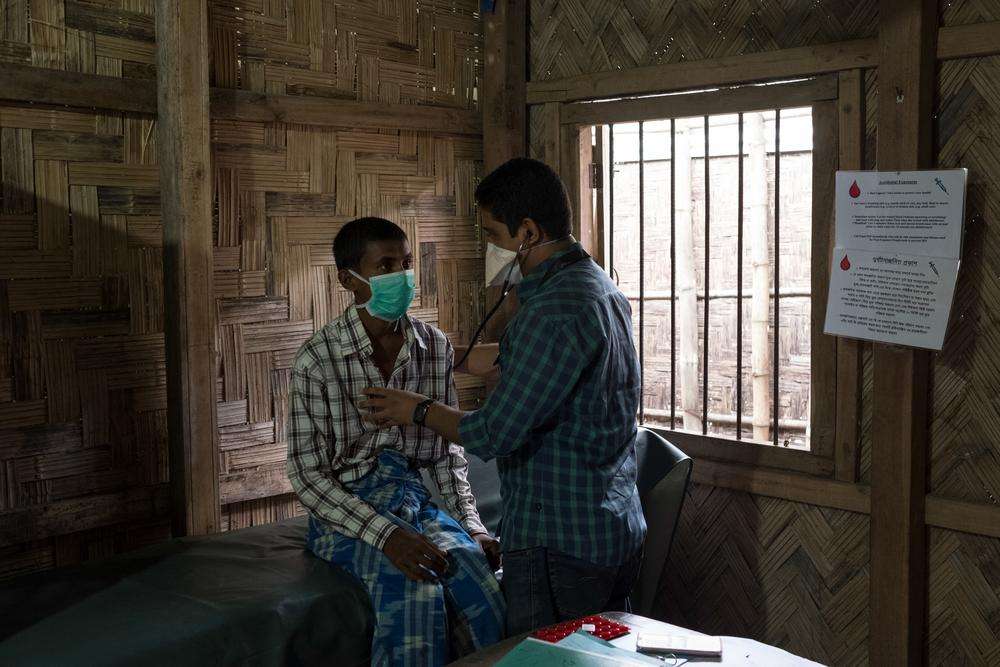Following a wave of targeted violence against ethnic Rohingya in Rakhine state, Myanmar, more than half a million people have fled to neighboring Bangladesh since August 25, 2017. This new influx of refugees comes in addition to the hundreds of thousands of Rohingya who fled across the border during episodes of violence in previous years. Conditions are dire for these refugees, most of whom have little or no access to safe water, essential supplies, or medical care.
Near the Kutupalong makeshift settlement in Bangladesh's Cox’s Bazar district, Doctors Without Borders/Médecins Sans Frontières (MSF) runs a medical facility and a clinic offering comprehensive basic and emergency health care as well as inpatient and laboratory services to both Rohingya refugees and the local community. Dr. Konstantin Hanke was the medical activities manager at the MSF medical facility in Kutupalong from early January until October 2.
"I joined MSF’s Bangladesh mission in January 2017, when Rohingya refugees were still fleeing the last outbreak of violence in Rakhine state [Myanmar] that started in October 2016. The clinic was consistently busy, with around 350 patients a day in the outpatient department and around 200 admitted patients a month. The population had run out of money and their health deteriorated.
We saw more and more severe malnutrition, particularly in children under five years old. At one point we had 20 patients a day with severe measles in our isolation tent. We received a lot of trauma [cases], and lots of accidents involving children, tetanus, rabies, and other cases I wasn’t used to seeing at home. At the facility we rarely see a newborn that weighs more than 2,500 grams [about 5.5 pounds]. The mothers are usually malnourished, so the babies don’t have a very good start.
"People Arrived in a Horrific State"
On August 25, when we learned of the deteriorating situation in Rakhine, we knew we might have to prepare for a new influx of refugees. That night the first fresh wounded arrived, and a situation that was already bad became much worse. Initially we mostly received young male adults, but in the following days we saw women and children as well. We saw patients with gunshot wounds and burns, and people with trauma and severe injuries who had somehow managed to cross the border. Then the fresh wounds stopped, and we started seeing patients who were seriously injured but had somehow managed to bring themselves to Bangladesh. It was really striking to see how they had made it from Myanmar to [reach] us.
Read More: Urgent Action Needed to Aid Rohingya and Avert Public Health Disaster
People arrived in a horrific state. Some said they had been trapped in houses that were set on fire. We treated unaccompanied children who had lost their families. One tiny neonatal baby was brought in by a woman who had found it in the grass at the border. She’s now caring for the baby in addition to her own children.
We treated a young girl with a head wound; an hour later her mother was admitted with severe burns. They said they were the only survivors from their family. The girl was always bringing her mother food and helping her eat. We’re providing play sessions for the child, counseling sessions, a caretaker to help with daily needs, and treatment for the mother’s burns. We’re also giving them supplementary feeding so they are in a better overall state to heal, and they are steadily improving.
Very Few Options
People have lost everything. Whole families have walked for days to reach Bangladesh. They have very few options. The poor conditions that most Rohingya live in have a direct impact on their health. At one point we received 13 people who had been bitten by a rabid dog that had run through the settlement. There’s no end to their suffering.
When you are sitting at home and it starts raining heavily, it’s hard knowing they are trying to sleep outside under the rain. I don’t even know if it’s worse when it’s raining or when it’s burning hot and they have no clean water. It’s not the only conflict in the world, but seeing this with your own eyes, and then seeing what is considered important back home, is very frustrating.
"People Are in Need of Profound Help"
The number of Rohingya who have arrived in the past five weeks is over 515,000 now: more or less the same size as the population of Nuremberg [Germany]. That might seem like an abstract number, but as a doctor here you see what that actually means. People are in need of profound help. A tiny bit more bad luck and we’ll have an epidemic on our hands. Comprehensive vaccination campaigns need to be started, and there is an urgent need for latrines and fresh water supplies.
Things were difficult enough for the people who arrived last year, but now, with so many new arrivals, it’s a catastrophe."
MSF first worked in Bangladesh in 1985. In response to the influx of refugees, MSF has significantly increased its water, sanitation, and medical activities for the refugee population. Elsewhere in the country, MSF works in Kamrangirchar slum in the capital, Dhaka, providing mental and reproductive health care, family planning and antenatal consultations, and an occupational health program for factory workers.




